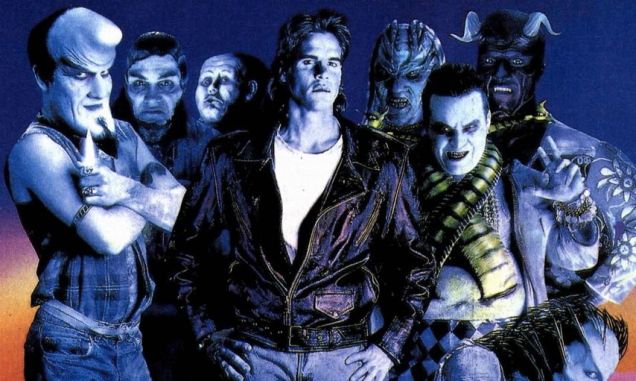Any cineaste knows how desperate
over-identification can turn a beloved film into a reliquary of validating
notions, a guiding text, not merely something to enjoy or observe. From 1987 to
1992 my alt-family of New York arts eccentrics found such a film, an unexpected
guide to living weird in Clive Barker’s valentine to monster family values,
“Nightbreed” (1990), which has recently been released in a sparkly new,
reassembled Blu-Ray edition.
Before “Nightbreed” there was, of course,
Barker’s first film, “Hellraiser” (1987). “Hellraiser” was downright punk rock
in the way it demonstrated that minimal technical skill was quite sufficient if
your vision was single-mindedly feverish. (It helped that cinematographer Robin Vidgeon aided Barker with matters of mise-en-scène). But the
film’s damp, delirious vision of sado-masochistic adventurers finding bloody satori
with fetish-gear demons called ‘Cenobites’ led by bemused and nail-skulled
Pinhead (Doug Bradley), the decision to wrap the gruesome package in Christopher
Young’s dark rhapsodies—all of that was pure Barker.
As Pinhead joined the pantheon of great
monster originals, the Cenobites became a go-to creature-look default, reappearing
with slight revisions in films such as Alex Proyas’ beloved “Dark City” (1998),
Paul W.S. Anderson’s terrifying “Event Horizon” (1997) and Drew Goddard’s
pastiche, “Cabin in the Woods” (2012).
What gave “Hellraiser” such an incredible electric
kick for my fringe circle of the irreparably damaged was Barker’s film’s proud,
absolute rejection of vanilla values; its face-kick in an American horror
cinema no less an authority than Stephen King proclaimed as being as
conservative “as a banker’s three-piece suit”. There was no soothing return to conservative
‘normalcy’ here. In “Hellraiser”, the real monster is a teen girl’s sexually
degenerate, murderous father, who is stopped from further mischief when Pinhead
tears him to shreds. The last image shows a monster flying, triumphant, into
the lens. It’s clear where Barker’s sympathies lie.

Which made Barker’s “Nightbreed”, a film where monsters are the full-blown good
guys, inevitable. We caught an early screening: fan love followed, which
metastasized into seeing the film as a Rosetta’s Stone for negotiating the raw
deals life had handed us. Unfortunately, for decades I’ve been unable to deal
with “Nightbreed”. Doing so meant confronting the predictable, intolerable real
world loss that came with looking to a mere movie for answers about, well,
anything perhaps. But while time may not heal, it at least scars. And so I took
a deep breath and hit ‘play’ on this painstakingly re-assembled, pristine
Blu-Ray edition, including 40 minutes of director recut footage long traded by fans of the film as “The Cabal Cut”.
Plot-wise, “Nightbreed” follows a small town
hunk named Boone (Craig Sheffer) who suffers eroticized visions of Midian,
“where the monsters live.” His bland girlfriend (Anne
Bobby) delicately suggests he see her shrink, Dr. Phillip K. Decker, who daylights as a
masked serial killer and is played, deliciously, by David Cronenberg. Long story
short, Boone finds Midian, a brilliantly designed underworld of caves, and interlaced
hanging bridges and walkways. He feels strangely simpatico with its citizenry
of exotic, heavily queer-coded monsters called ‘the nightbreed.’ Dr. Decker,
however, wants to kill Boone and destroy Midian, which irks him because of its
Otherness acceptance. A final conflagration between Decker, Boone, the ‘breed
and a redneck posse reveals that Boone is predestined to become the nightbreed
savior. In a barn that’s lighted so it looks like a certain manger, he accepts
his charge and promises to find them a new home. Fin.
Meanwhile, in New York City, the “Nightbreed” my alt-family quaffed in
multiple attendance gulps was an incredibly romantic, fantastic vision that
mirrored, forgave, redeemed and validated what we saw and mostly loathed in our
weird, damaged selves, denizens of the city’s outlier music, art, performance
and drag undergrounds. There was my best friend/inspiration LaVie, a true
visionary installation artist who loved boasting to norms about jilling off to Times
Square’s most grotesque 8mm porn loop booths, from zoo to injury porn, “to prove
I can take it, no matter how f—king sickening ‘it’ is,” the same way she took
what her monster bio-father doled out, never sparing him a tear.
And Deke, a blond trans sculptor,
chicken-bone thin from early neglect. And don’t-touch-Tina, shave-headed gilder,
sweetheart and self-mutilator. And Paul the model, whose famous father paid him
to deny the linkage. And Xi, the virtuoso guitarist whose eyes just went dead
as killed deer if you said the wrong word. And more. (Details about my friends
have been scrambled and reassembled for what I think are understandable
reasons.)

While we loved how Pinhead had the ability
to choose and enjoy suffering (how great would that be?), “Nightbreed” offered an
entire underground metropolis of monsters, living glamorously, romantically, safely with each other.
LaVie wept: she wouldn’t be demeaning
herself in Times Square booths—she had a way better metaphor. We all did.
Ultimately, we took “Nightbreed” love way too
far. But for a while, it was good, in the limited way anything can be good for
long for survivors of childhood sexual devastation, or victims of mental
illness, brain dysfunction brought on by early physical injury, of addiction or
various devastating co-morbidities. We separated art, music, writing, film and
people into two camps, ‘breed and not-‘breed. This was absurdly reductionist and smelt of a high school-level goth worldview,
but f—k it—it was useful.
The cacophony industrialists of Throbbing
Gristle, Psychic TV and Cabaret Voltaire were obviously ‘breed music; the
boomer rock canon was noise. “Ms. 45”, “Peeping Tom”, “Carrie” and “Santa
Sangre” were ‘breed n’est plus ultra. “Parenthood”, “Field of Dreams”, “Father of
the Bride” and “Pretty Woman” were triggers fronting as cinema. We missed good
stuff but for several years, our two-tone rating system made things easier,
safer.
‘Safer.’ If there’s a more precious quantity
for people raised on threat, predation, breakage and fear, I can’t think of it.
And so I feel almost like a traitor to report the new “Nightbreed” Blu-Ray to
be lacking by most common standards.
We find that Barker hasn’t advanced as a
filmmaker. While the shadow-play evokes Cocteau
and the sheer number and quality of make-up FX creatures still impress—a whacky
chain-smoking, face-peeling rocker, a femme fatale covered in porcupine spines,
an obese man with on-board snakes and many more—their director doesn’t seem to
know how to film them for cinematic impact. The film’s central love story makes
more logical sense but is doomed by Sheffer and Bobby’s negative integer
chemistry. Worse still are action scenes that play out like mismatched second
unit work and mysteriously poor glass matte paintings. But ultimately, it’s the
film’s creaky, overt fakeness that imparts a perversely sweet, utterly
cynicism-free fairytale charm. I just wish I could talk about this with my old alt-family.
But I can’t. They’re gone.

The ‘breed thing
faded as pathology eclipsed metaphor. LaVie broke down utterly, one doctor
speculating that she’d always been a
high-functioning schizophrenic, that whoever we may have loved may have not been
much more than an assemblage of a disorder’s symptoms. Her location is a
mystery.
Deke left New York with no forewarning
address. Tina just dropped dead in Tompkin’s Square Park, an aneurysm at 30. Years
later an autopsy would reveal that that it was Tina’s mix of street speed and
pharmaceutical uppers that caused a massive coronary before she turned 38. Paul
died horribly by his own hand before 30: I don’t wish to go into detail. Xi disappeared.
The mental illness I’d fought since I was 14,
the life-style of self-harm and hospitalizations, manias and killing shames
finally, twenty years after “Nightbreed,” was given a diagnosis: Rapid cycling Bipolar
I with chronic PTSD. For which I take a constellation of medications. More
importantly, I have the stabilizing love of a great partner.
Regarding the new “Nightbreed”—as I’m get
around to accepting both its place in my autobiography and its technical
shortfalls, I can still report that its creaky-yet-eerie-sweet mojo still
holds, even for those of us who, as adults, have long ago given up any on one-stop,
cinematic ideology fixes. I’m grateful for what Barker’s film gave us; I
certainly don’t blame it for anything. It wasn’t a failing in the art or in
loving it too hard that contributed to our falls—that would happen no matter
what, eventually. As is often said on the beautiful/horrific “Hannibal”, a
‘breed show if ever there was one, it was our design.
And as glaringly imperfect as this
rejiggered “Nightbreed” is, Barker’s essential vision continues to reach
outward to the dark in an ultimately indescribable way to a very select
audience, even after all these years.
You know who you are.












